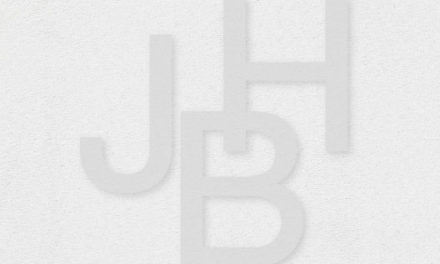Treasure of Roman art
As soon as you arrive there’s a powerful visual impact. We are at the Palazzo Borghese, a treasure of Roman art, a villa created by the Cardinal Scipion Borghese (1577-1633), the rich nephew of Pope Paul V who managed his abundant wealth.
Bernini, Caravaggio
The mix of papal assets and those of the family facilitated his inclinations as an enlightened collector, to the extent that he became a patron of the sculptor Bernini and the lucky owner of several very famous Caravaggios, which have now gone down in collective memory, like his “Boy with a Basket of Fruit”. Over the generations the collection met various fates before being sold to the Italian state in the early 20th century.
Jacquemart-André
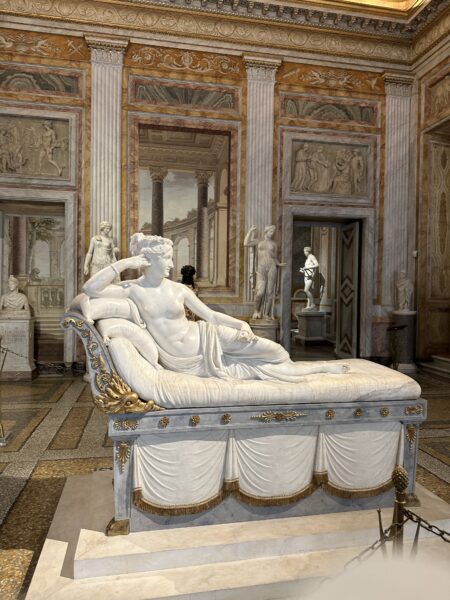
Galleria Borghese
From 6 September 2024 some of these treasures will also be presented in Paris at the Musée Jacquemart-André as part of a sequence of partial works at the legendary palace. But that’s another story.
Splendour and intruders
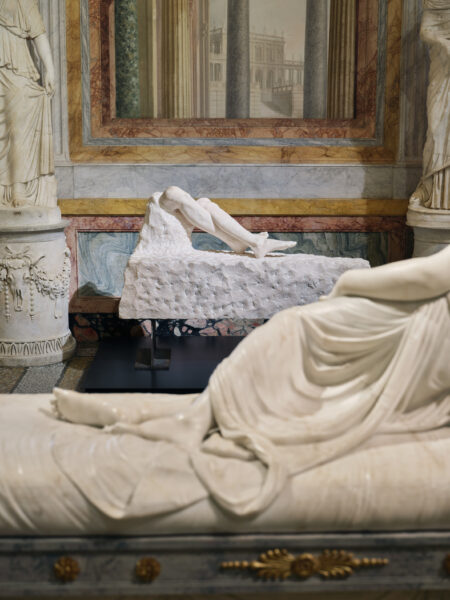
Galleria Borghese
Here, it’s first and foremost the appearances that are striking, because they express a boundless desire for splendour. From floor to walls, polychrome marble. As for the ceilings, they are decorated with painted frescoes. But until 15 September the rooms and a small section of the garden are marked by the presence of intruders.
Psychological torments
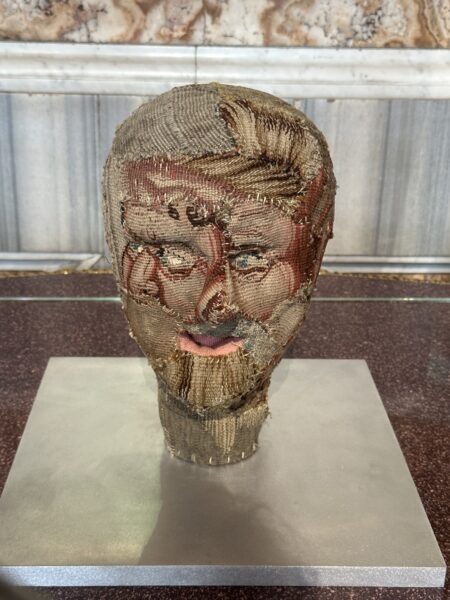
Louise Bourgeois
In the midst of this general opulence there are around twenty contemporary pieces, most of which are monumental, by the French American artist Louise Bourgeois (1911-2010) (See here an other report about Louise Bourgeois). We know her work, major in the 20th-century, in which she was able to express in three dimensions her psychological torments and also loving sentiments.
Bronze spider
In the garden a bronze spider measuring 7.5 metres watches over the palace. It symbolically represents the artist’s mother, a long-time weaver, who in the Bourgeois household was charged with repairing old tapestries which her father then sold. People often talk about the “family unit” (in French this term is “cellule familiale” or literally “family cell”). And in a sense Louise took this expression and used it to create from 1991 a series of spaces enclosed by bars, filled with symbolic objects.
“Family cell”
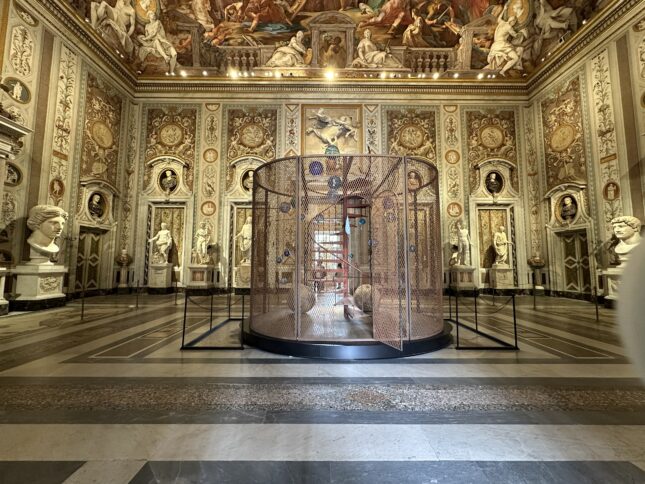
Gallerie Borghese
In the Mariano Rossi salon we find one of these “cellules” animated by a spiral staircase that leads nowhere, surrounded by balls of blue glass, like planets in space. These stairs come from one of the artist’s former studios. We can see the abandoning of her cherished space of work, but even more so the depiction of a world that leads to death.
To appreciate is to support.
To support is to donate.
Support JB Reports by becoming a sustaining Patron with a recurring or a spontaneous donation.
Dangerous passage
On the upper floor, in the Loggia di Lanfranco, there is another cellule of a spectacular size since it measures 8.7 metres. But the size is nothing compared to the power of the piece, baptized in French as “Passage dangereux” (Dangerous Passage). The cellule is filled with a multitude of objects meant to express the shift from a stage of infancy to adulthood. The offering is hard to read, weakened by this profusion.
Testament to trauma
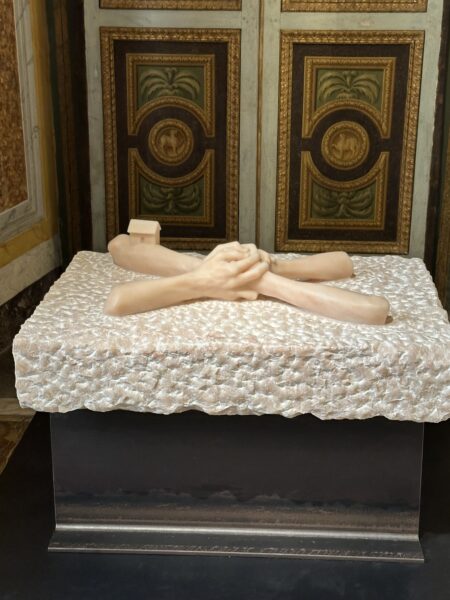
LOuise Bourgeois
One of the most striking installations is one in the room of emperors filled with marble busts, featuring heads fashioned from embroidered fabric. They resemble blind and deaf figures, a testament to trauma. They could just as well be used in magical rituals to stick pins into. Here, the prestige of appearances is confronted with power, like they used to do in antiquity and the darker side of the 20th-century in a more intimate fashion…
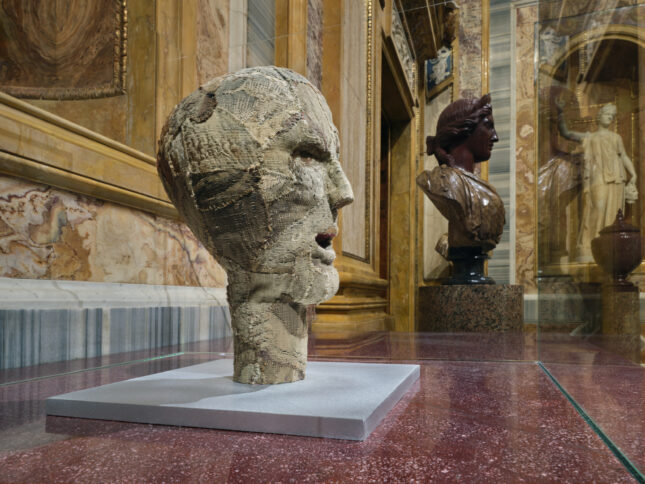
Galleria Borghese
Philip Larratt-Smith
Philip Larratt-Smith, co-curator of the exhibition, comments: “This exhibition shows to what extent Louise also became classical.” He adds: “When she came to Rome for the first time in 1967 she fell in love with the Berninis in the villa. She wrote to her husband ‘it’s like in a dream”.
The dream continues in her company.
Until 15 September. https://galleriaborghese.beniculturali.it/
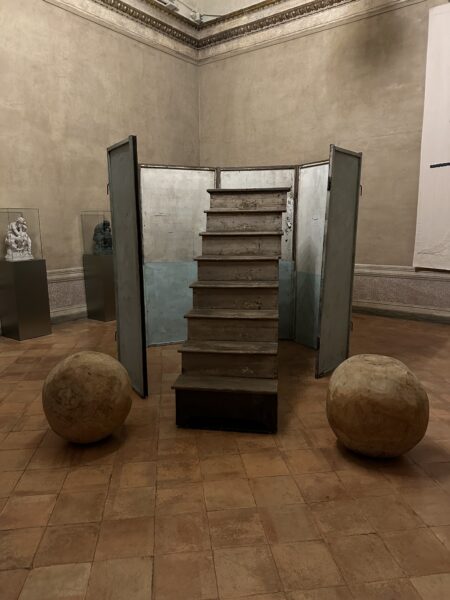
Louise Bourgeois
The Villa Medici is conjointly exhibiting two pieces by the artist until 5 September: www.villamedici.it/fr/expositions/expo-louise-bourgeois/
Support independent news on art.
Your contribution : Make a monthly commitment to support JB Reports or a one off contribution as and when you feel like it. Choose the option that suits you best.
Need to cancel a recurring donation? Please go here.
The donation is considered to be a subscription for a fee set by the donor and for a duration also set by the donor.

